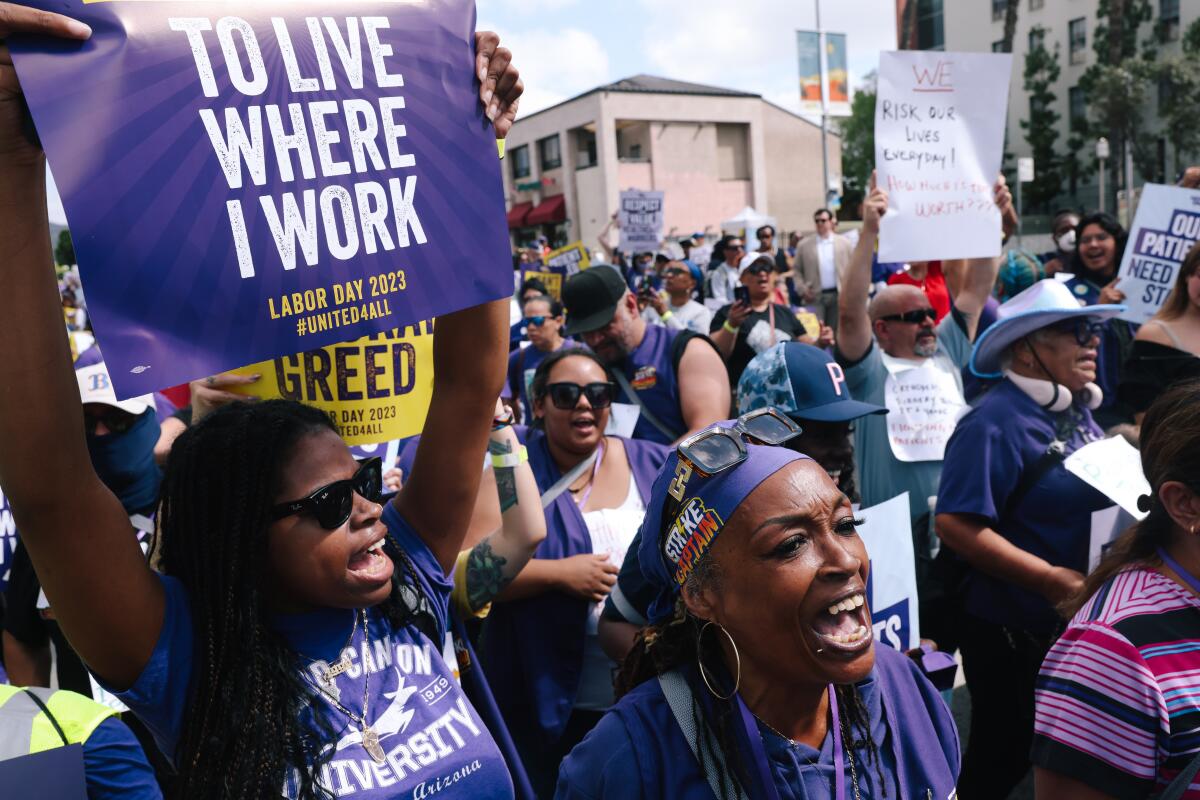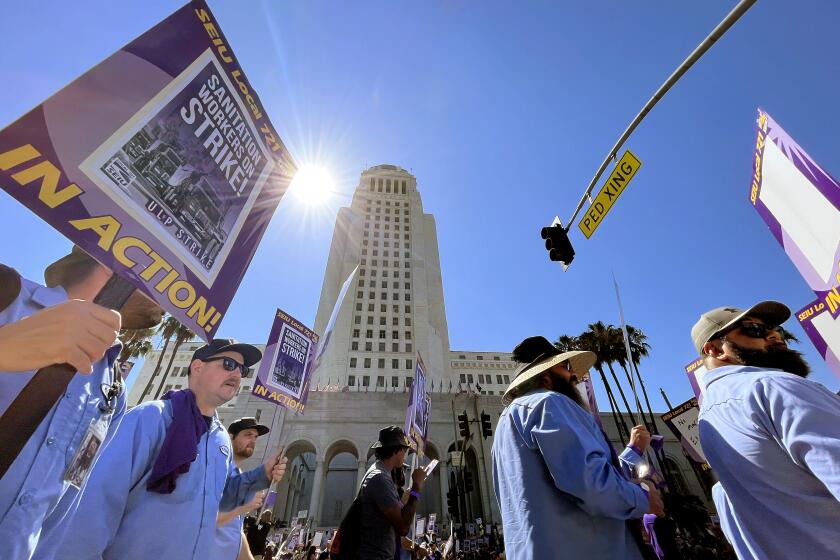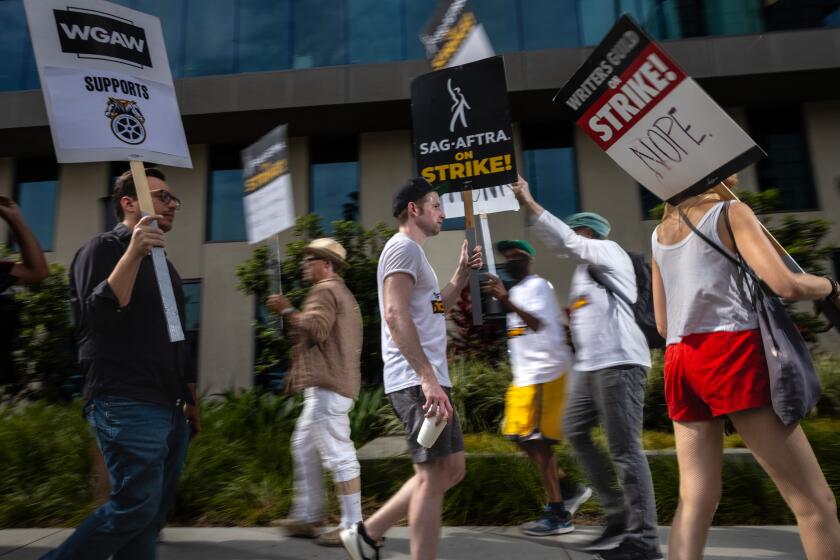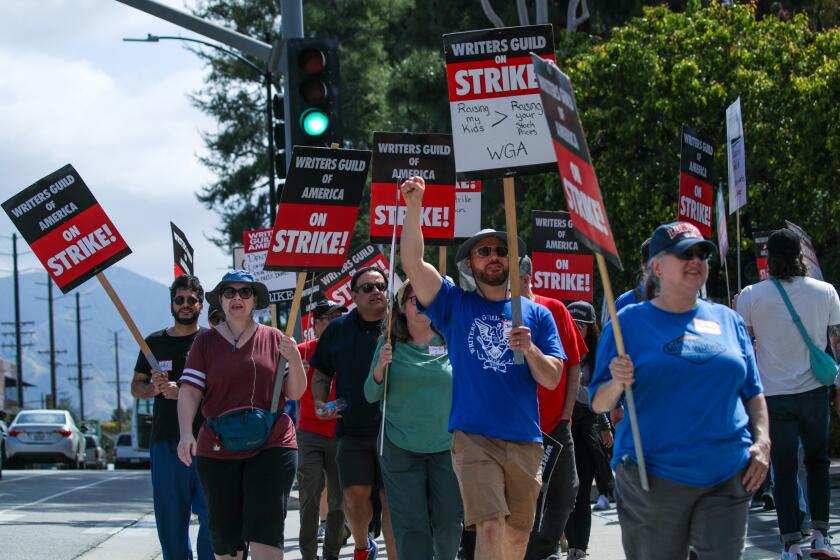More than 75,000 Kaiser workers in California and elsewhere plan to strike next month

Tens of thousands of Kaiser Permanente employees in California and elsewhere plan to go on strike in early October after the healthcare giant and unions that represent a huge swath of the Kaiser workforce failed to reach an agreement this week that resolves concerns about pay, staffing and other issues.
The Coalition of Kaiser Permanente Unions announced Friday that a three-day strike could begin Oct. 4 to protest Kaiser’s “bad faith bargaining” over solutions to what the coalition calls a “staffing crisis” that puts patient safety at risk. The strike will move forward if a deal isn’t reached by Sept. 30, when the unions’ current contracts expire, the coalition said.
“Kaiser executives refuse to acknowledge how much patient care has deteriorated or how much the frontline healthcare workforce and patients are suffering because of the Kaiser short-staffing crisis,” Dave Regan, president of SEIU-United Healthcare Workers West, said in a statement from the coalition.
Kaiser Permanente noted that the unions’ decision to issue a 10-day strike notice doesn’t guarantee that a strike will happen. The organization said in a statement that it would “continue to bargain in good faith until we reach a fair and equitable agreement that strengthens our position as a best place to work and ensures that the high-quality care our members expect from us remains affordable and easy to access.”
The strike would affect Kaiser facilities in California, Oregon, Washington, Colorado, Virginia and Washington, D.C., according to the coalition, which includes members of four international unions. Hospitals and clinics would be deprived of a range or workers represented by multiple unions, including medical assistants, phlebotomists, information technology workers, surgical technicians, lab technicians, pharmacy clerks, social workers, food service workers and housekeepers.
More than one-third of Kaiser’s workforce is represented by the unions planning to participate in the October strike, the employer said.
Union leaders said the action is poised to be the biggest strike by healthcare workers in U.S. history.
What’s happening now feels different. There’s a level of cross-union support across radically different workplaces, along with a knowledge of one another’s respective struggles, that I’ve never seen, or frankly ever thought possible.
Kent Wong, director of the UCLA Labor Center, called Friday’s announcement “quite significant” in light of the large number of people served by Kaiser. The move by the healthcare workers comes on the heels of “a dramatic series of strikes” by hotel workers, writers, actors, autoworkers and other laborers, which “contribute to a sense that worker solidarity makes a difference and collective action can move the agenda forward,” he said.
“The pandemic has generated widespread feelings that the system is not working for working people,” Wong said, reflected in the fact that “support for unions has not been higher in decades.”
SEIU United Healthcare Workers West and many other unions in the Coalition of Kaiser Permanente Unions announced this month that their members had voted overwhelmingly to approve a strike if no agreement is reached by the end of September, when their current contracts run out. Members of the unions that make up the coalition work in California, Oregon, Washington, Hawaii, Colorado, Maryland, Virginia and Washington, D.C.
Union leaders have faulted the Oakland-based health system for chronic understaffing that they said drags out waits for patients and hampers patient safety.
“Healthcare workers see how Kaiser patients are forced to wait unsafe lengths of time for cancer screenings, room assignments, test results, primary care appointments, X-rays, surgeries, waiting in emergency rooms, and more,” Audrey Cardenas Loera, a fees and benefits support specialist at Kaiser Permanente in Hillsboro, Ore., said in a statement from the union coalition. “We simply want our patients to be safe and get the care that they deserve.”
The coalition also said wages have failed to keep up with the rising cost of living, and it accused Kaiser of not bargaining in good faith to fix the problems.
Kaiser has said it has made a concerted effort to bring more employees on board and has invested in workforce development programs to train healthcare workers. It also described itself as a leader in wages and benefits.
Los Angeles is sitting at the vanguard of two trends: increasingly expensive housing and an increasing amount of cross-union solidarity.
Wages have been a major sticking point in the negotiations. SEIU-UHW, which represents nearly 60,000 workers in California, said the coalition pushed for a minimum wage of $25 per hour across the Kaiser Permanente system, while the health system proposed a floor of $21 per hour. Union leaders also said Kaiser’s proposal for wage increases would not keep up with the rising cost of living.
Last week, Kaiser said it was offering “across-the-board wage increases” ranging from roughly 10% to more than 14% over four years. The bigger raises would go to workers in regions where wages aren’t at least 10% above what local workers make for similar jobs, Kaiser said.
“Market wages are currently at different levels all over the country, so we need to tailor wage increases so everybody benefits fairly,” Kaiser said in a statement released ahead of Labor Day protests. In areas where wages are well above the market average, “it makes it harder for us to offer affordable care,” and in areas where wages are below it, it’s harder to “retain the best people.”
In addition, employees get “very generous healthcare and retirement benefits,” Kaiser said.
But the unions said none of the proposed raises were acceptable and objected to the regional approach to wage hikes.
In Southern California, for instance, Kaiser said it was offering a roughly 10% increase over four years — lower than in other areas — plus lump-sum bonuses of 4%. SEIU-UHW spokesperson Renée Saldaña said bonuses don’t boost pay in future years or factor into pensions. She also raised concerns about rising costs in L.A.
“Housing and rental prices have skyrocketed in Los Angeles, as have the prices for food, gas, and other necessities,” Saldaña said last month. “Why does Kaiser want to treat our caregivers in Los Angeles as second-class to the rest of the state?”
The recent run of wins in the Legislature for organized labor was remarkable. Now Gov. Newsom must decide if union-backed bills will become law.
The unions also allege that the healthcare giant has engaged in unfair labor practices. In August, Regan said that at one point, Kaiser representatives “literally refused to even enter the room and talk to us.” The union coalition also alleged that during the course of negotiations, Kaiser had refused to provide information they requested, including details about its finances.
Kaiser said in August that accusations that it had not bargained in good faith were “unfounded and counterproductive.”
“We have been there for our people during the pandemic, and we will be there for them going forward,” Kaiser said in its statement, asserting that it had weathered the pandemic and its stresses on healthcare workers better than other organizations due to its “excellent pay and benefits” and other assistance for employees.
Last week, after tens of thousands of workers agreed to authorize a strike, Kaiser said it remained confident an agreement would be reached in time. However, it also assured Kaiser members that it had “comprehensive plans to ensure continued access to needed healthcare services, should a strike occur later this year.”
The health system is largely unionized: Nearly 75% of the Kaiser Permanente workforce is represented by labor unions, including others not in the coalition, according to the employer.
Among those other unions is United Nurses Assns. of California/Union of Health Care Professionals, which represents roughly 24,000 Kaiser registered nurses, nurse practitioners, optometrists and other healthcare workers, the vast majority of them in Southern California.
Its president, Charmaine Morales, said workers at Kaiser “have been pushed to the breaking point and beyond by staffing shortages” and that the union stands in solidarity with the coalition.
“We’ll see you on the picket line,” Morales said in a statement Friday.
More to Read
Sign up for Essential California
The most important California stories and recommendations in your inbox every morning.
You may occasionally receive promotional content from the Los Angeles Times.













